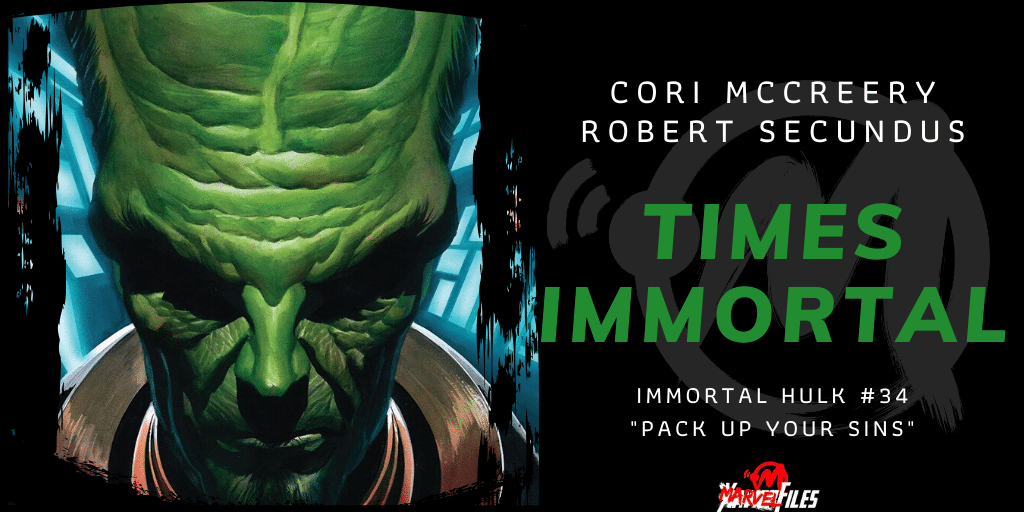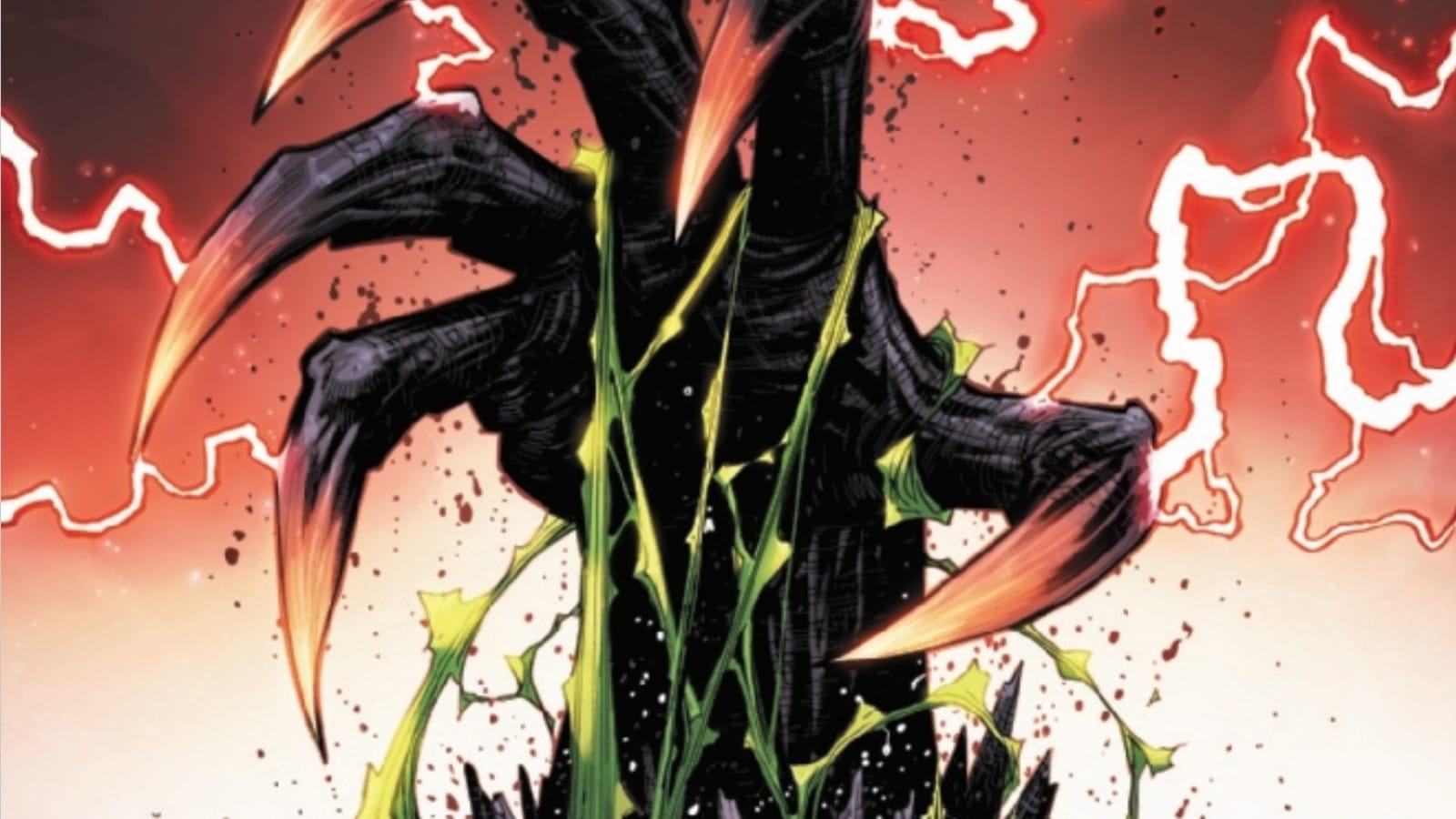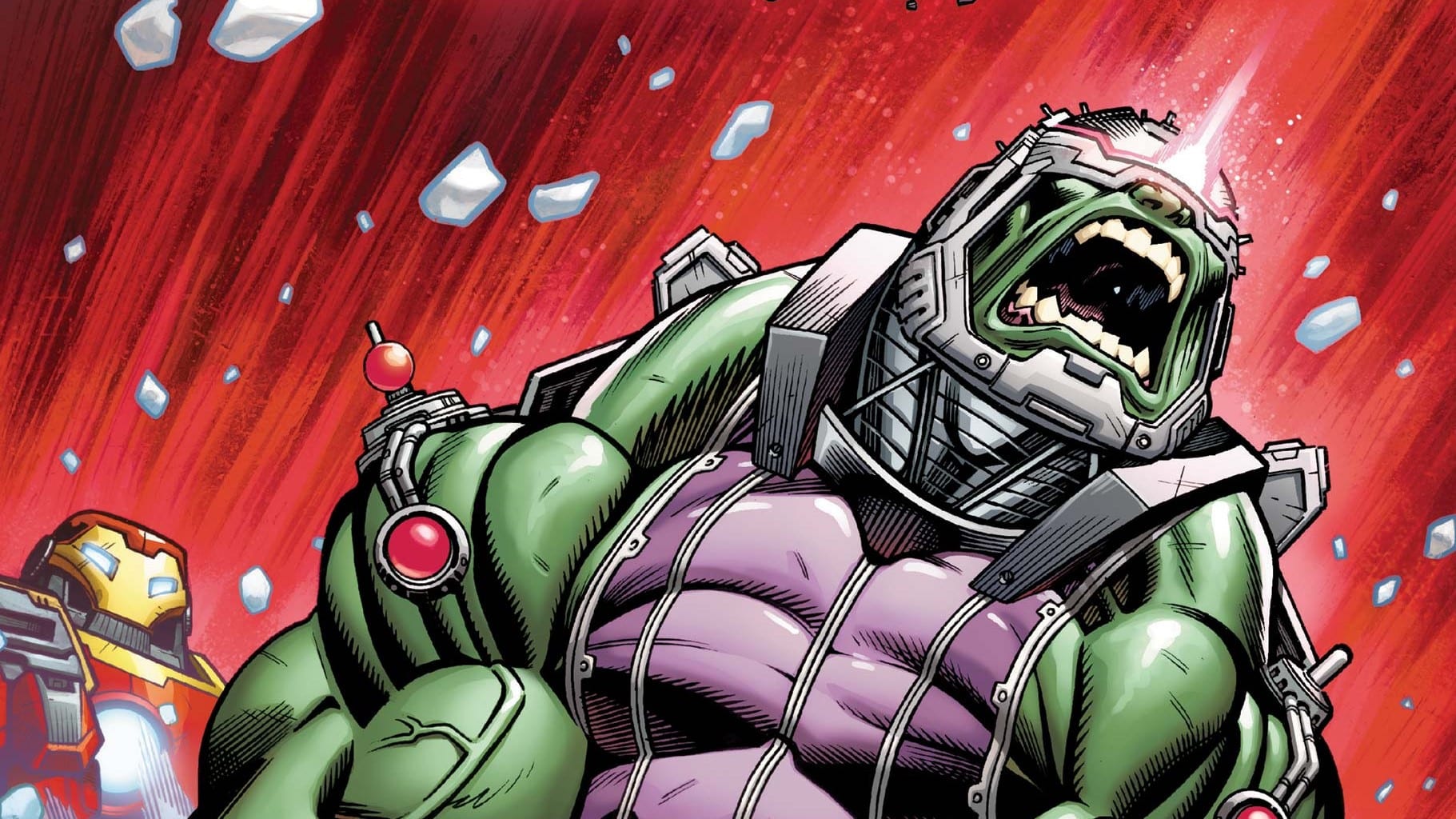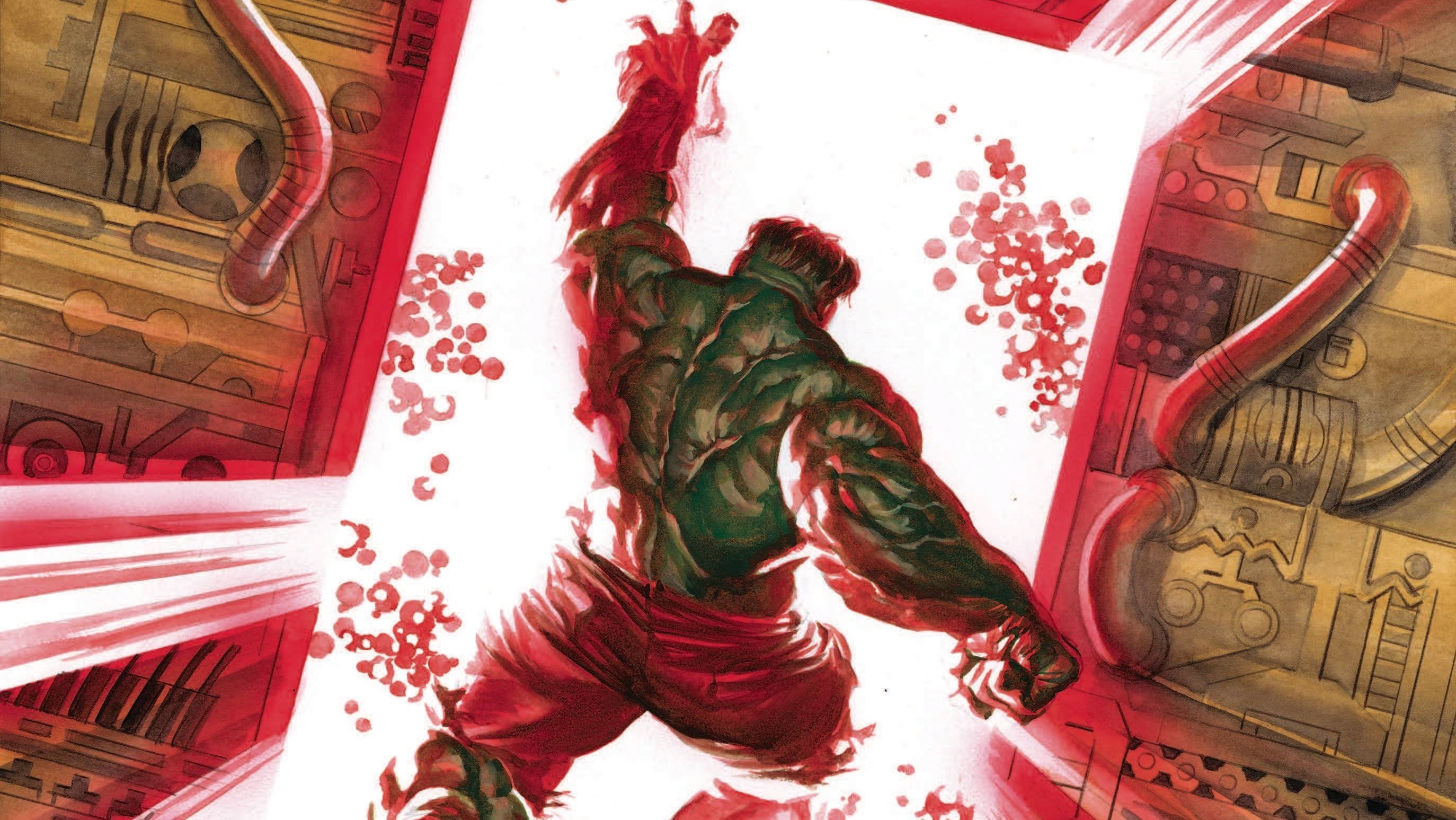Hello friends and readers, it’s time for our triumphant return to Times Immortal! In this issue of the blockbuster Hulk saga, we see the retold story of the Leader as he travels from death to life and back again, in search of godhood. Check out our coverage on this tale by Al Ewing, Butch Guice, Tom Palmer, Paul Mounts, and Cory Petit!
Robert Secundus: We seem to have experienced several apocalypses since last we spoke, gentle reader, and much has changed, including Times Immortal. Zach Rabiroff has launched his new column, “No-Prize Like the Present,” at ComicsBookCase.Com, and if you enjoyed his work here, you will be overjoyed when reading this new project. Please join me in welcoming Cori McCreery to the Xavier Files bullpen and to Times Immortal. [Imagine here some applause]. Then go check out her EISNER NOMINATED work at Women Write About Comics.
Now, before we begin properly, I do think we need to stop a moment and speak to something serious. Times Immortal has thus far often talked about violence and oppression in our society, and that will continue, as the subject of this series also continues to comment on that violence and oppression. We shouldn’t just read and retweet about these things if we can do more. For the first time in a long time, it seems like there is some small amount of hope that some of the injustices of the human world might be destroyed, or at least dealt a terrible blow. Please, if you can, support your local protests, please advocate for progressive policies in your communities, and, if you can, please donate what you can to help keep the fight going. Consider, at the very least, removing your least favorite title from your comics pull and donating that $4 monthly.
Cori McCreery: Thanks for the warm welcome Rob! It’s great to be here. I’ve been lurking here at Xavier Files for awhile, waiting for X-Factor to launch, but during some recent downtime I was able to sit down with all of Immortal Hulk and was just absolutely gobsmacked by it. I’ve never been a Hulk fan before, but had heard nothing but glowing reviews for this book, and boy were they right. I finally decided to read the book because of the mere suggestion of transgender representation, but everything else made it go to the top of my must read list.
Better To Party In Hell
RS: The issue begins with a quotation from Irving Berlin’s “Pack Up Your Sins and Go to the Devil, a jaunty tune about a jazzy hell and a stuffy, no-fun heaven. I feel like it’s been a bit since we got a straight up Satanic epigraph to start off the issue, and this one is definitely highlighting a tone I don’t think we’ve seen before; Cori, what did you think of the epigraph, or how it set up the issue?
CM: Well, I have to say first of all that I’ve been listening to the Ella Fitzgerald version repeatedly since reading the issue, so it did it’s job in that respect. And like you said it definitely sets a different tone than previous similar epigraphs. It kinda sets up Sam as an alternative to the reluctant devil that is the Immortal Hulk, a devil that embraces and has fun in that role. Someone who wants to be the monster under the bed of humanity. It’s an interesting way to set up a villain when you’ve spent nearly three years setting up your hero as his own kind of monster.
RS: Absolutely; I haven’t read many comics featuring The Leader, but my impression was always that he was a pretty weak foil for the Hulk; Hulk Strong, Leader Smart, that sort of thing. But that shift from Brains/Brawn to Agency/Reluctance is really, really interesting. It also feels like a logical next step in the series’ ongoing exploration of Satanic Types. We’ve gotten the Job-style Satanic Accuser in The Devil Hulk, a supernatural force on Earth to test and try humanity and human institutions; the Kabballistic One Below All, the antithesis to God; the classical Satanic Tempter in Brian Banner; now, in the Leader, we’ve got a Faust. We’ve got a character who, for all of his brilliance, cannot see the probable doom that lies at the end of all his Satanic bargains. But by the end of the issue, we’ve also got a Mephistopheles; it’s the Leader offering to make a bargain with Brian Banner from a superior place of power.
CM: Mephistopheles, he’s the one that Spider-Man sold his marriage too, right? Kidding, kidding. Yeah, the various different takes on the Devil are so interesting to me, as someone who is very divorced from religion as a whole, your analysis is always super enlightening to me, because most of my own knowledge on the subject is mostly “Devil bad.” But it’s certainly much more nuanced than that, even when exploring the origins of Satanic presentation, and how he can be taken as more of a sympathetic character than most of Christianity would like you to believe.
RS: Absolutely; from obscure Christian Gnosticism, to Milton, to Goethe, this series pulls from a variety of sources far more complex than the rather narrow view of modern mainline Christianity. Speaking of Goethe, I think it’s important to keep in mind, as we go forward, that not all versions of the Faust story end in damnation. Some see him saved.
CM: The only Faust I know, is the DC Comics villain, and I know that’s not the right one for this, though I’ve definitely heard the term “Faustian Bargain” before, so you may have to explain this to me a bit more.
RS: The story of Faust usually goes like this: some extremely smart German Dude gets bored. He’s learned all there is to know in human philosophy and science. And it isn’t enough. So he summons a devil, Mephistopheles, and agrees to sign away his soul for knowledge and power. In Christopher Marlowe’s version of the story, he uses his preternatural powers to leer at Helen of Troy and play pranks on the pope. In the end, he’s dragged to Hell, cursing himself, the devil, and God. In Goethe’s version of the story, Faust repents in the end and, even though he signed away his soul, still ascends to heaven, because it’s never too late, in Goethe’s mind, to change your life.
Evolution and Apotheosis
CM: The story of Faust there is definitely important here, because one of the key aspects of this issue was about Stern’s evolution, through a series of deaths and rebirths, growing ever smarter and smarter, all the while sacrificing bit after bit of his soul. He seems to be more than willing to continue trading scraps of his humanity for more and more power as the years progress. He’s growing ever closer to the idealized version of himself that he is striving to be.
RS: Even when he’s Just Sam, he claims, he’s still always growing “a little bit smarter.” Even when the gamma goes away, he continues to choose to reject, over and over, the love for his brother, a normal life, his own humanity. We’re both relatively new to the character, so Cori, I’m wondering what you make of him? Is this a tragic story about a man who sacrifices too much for a destructive, false ideal? Or is this a horror story about a depraved monster who wants to seize greater and greater personal power?
CM: Yeah, see this is completely different from the origin I expected for the Leader. My only exposure to Sterns prior to this was in the Ed Norton Incredible Hulk movie, where he’s a doctor, while it seems in the comics his position at the start of his evolution was much lower. To me it feels more like that tragic tale, in that Sterns was a forgettable peon, spending his life doing grunt work with no thanks or recognition, a life doing nothing remarkable, nothing special, when something incredible and monumental happened to him to change that. And that little taste of something more, of something greater, drives him to continue craving more and more. He was never special before, but he is now, and if he doesn’t find a way to keep being special, he’ll disappear into the margins again.
RS: So I wonder– if he keeps trying to become something more, if he keeps becoming greater and greater, what is he moving towards? I’m reminded of Metatron:
RS: The title of the issue is “Apotheosis.” It means, essentially “From [human] [to] God.” In Greek myth it describes the moment a mortal enters the Pantheon. In Eastern Christianity, “theosis” describes the process of moving ever and ever closer to union with the divine. Theologians will even use the word “deification” to describe the moment a human being enters Heaven, so close does the mortal mind come to divinity by sheer proximity to the divine. It is a weird and interesting word to give to this particular issue, that opens with a song about Hell and ends with a man travelling to the damned. So: where is the Leader going? Where is he headed on this path? And what kind of Divinity is he hoping to obtain?
CM: I know you’re trained to look at this with an eye more specific to Christianity, which is absolutely important, but years of mythology and fantasy reading has given me an eye more specific to broader pantheons. So perhaps he’s not trying to unseat God, but rather become an axial opposite equal in power, to provide that evil deity that exists in so many pantheons both historical and contemporary. In Pathfinder terms, there has to be an Asmodeus to balance the cosmos to the purity of Iomedae. He wants to become a god, just not specific to which one.
Continuity and Journal Entries
RS: We’ve alluded to this a few times thus far, but how incredible is it that this issue doesn’t just set up the next conflict and recontextualize the previous few arcs, but also contains the Leader’s entire history, including weird nonsense like his Red Years and Occult Phase, and not only makes that weird history intelligible, but makes it seem like one complete, unified story??
CM: Something that’s been impressive to me from the start is that Ewing makes 60 years of Hulk continuity absolutely digestible for someone who had no prior knowledge of the Hulk’s story other than the bare minimum. I knew bits and pieces from the movies and just general osmosis, but had never truly devoted any time at all to learning about the Hulk or his side characters, and now I feel like I know enough about them to explain them in general terms to other newbies to the mythos. And that’s what this issue really did for the Leader. It gave us good knowledge of who he’s been, what he’s done, and where he might be heading; while at the same time tying everything into the new mythology that Ewing has built. I especially loved all the references of the Green Door throughout.
RS: Even 34 issues in, that Green Door is still haunting to me, whenever it shows up. It’s such a simple image– a green shaft of light in darkness– but I think that simplicity is part of what makes it so horrifying. On the road to Hell, you don’t stumble upon a massive gate emblazoned with warnings. You find a simple door. Anyone can open it. Anything might come through.
CM: The door is absolutely an ominous symbol. It’s so stark and bright, and I feel drawn to it like a bug to a bright light. It’s terrifying, but also I have to see what’s behind it. And while it’s frightening, I’m also conditioned as a DC fan to feel comforted by glowing green lights in the darkness. Maybe it’s a Green Lantern back there, ya know? Or what’s his Marvel analogue, Doctor Spectrum, right?
RS: Doctor Spectrum or *googles* Quasar? I uh, haven’t read much Cosmic Marvel outside of Bendis GotG (stop booing! Stop booing! I’ll get to Annihilation eventually!) Anyway, Cori, what did you think of the way the Leader’s continuity was framed, through memos and journal entries? I thought it was a great way to avoid this being pure infodump; every time we were given information, we were also given a view into the Leader’s mind. Weirdly, I think we might have a better glimpse, after one issue, of the Leader’s interiority than we have the title character throughout this series.
CM: I loved the journal entries. They felt like a chronological look at Sam’s descent into madness and monstrosity. You could just feel him get a little more unhinged with each subsequent entry. Just a little more depraved each time, a little less human. One thing I do wonder is the significance of the numbers. Obviously, the first number before the slash is the life he’s currently on, but what importance to the second numbers have if any. The only one that’s obvious to me is 3/666, because of course his meeting with Mephisto would be that one.
RS: The numbers are: 1/1, 1/22, 1/35, 1/587, “who knows,” 2/1, 2/107, 3/498, 3/540, 3/582, 3/666, 3/797, 3/922, and 4/1. My Numerology Senses aren’t tingling, but if you, Gentle Reader, detect some pattern or significance, please let us know!
RS: This issue really surprised me, which, at this point, 34 issues in, shouldn’t itself surprise me. Previously, I felt leaving behind Dario Agger, one of the greatest modern additions to the Marvel universe, and Xemnu, a bizarre, terrifying early Marvel creation, for a Typical Hulk villain was a downgrade. Now, I’m excited to see where The Leader takes us.
CM: Likewise, it was not necessarily a direction I thought would be so intriguing, but then I didn’t expect a Hulk book to be at the top of my list period, either. It also felt like this was kind of a perfect issue to return from the unintentional long break, as it didn’t rely heavily on what had just happened to set up what’s coming next. Super excited to continue covering this wonderful and thought provoking book with you Rob!
Marvelous Musings
- Gamma Radiation might be made of anti-Kirbons?? [Ed. Note: Kirbons first appeared in Powers of X]
- Every issue without Metatron Content pains Rob; all he wants is more angels in superhero comics
- It’s okay Rob, you’ve got your pal Zauriel now.
- Funny that I joined to bring a trans lens to this series, and then the first issue I’m on she’s nowhere to be found.
- Al Ewing and co basically took a Marvel Wikia concept and turned it into an incredible work of graphic fiction







